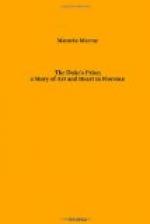But bravery could avail little against such numbers. The Greeks were driven back, killed, overpowered by the vast odds against them. Forced from the quarter deck into the middle of the vessel, they stood there like their forefathers at Thermopyl’, and fought for their freedom. Not a word was uttered, not a cry from either side, but foot to foot and steel to steel the combatants waged their deadly warfare. Suddenly Ranadar disappeared below, and in a few minutes returned with a beaming countenance and fresh energy. Rushing at an enormous Turk who wielded a tremendous scimetar, the corsair attacked him. In a few moments the Turk was disarmed, but springing at Ranadar, he held his sword arm tightly, and sought to throw him over. Ranadar dropped his sword, and closed with the Turk. They swayed backward and forward, they fell and rose, they whirled round in endless convolutions, so that neither Turk nor Greek could strike a blow for his countryman. But even Ranadar seemed to gain. Holding his adversary tightly by the throat, he forced him to the vessel’s side. He pushed—he strained—and then—and then—with a mighty noise which seemed as though the air was rent with a dazzling flash, and smoke, and fire, and blazing brands, and shattered vestiges of broken ships, amid arms, and dead bodies, and a thousand hideous shapes and forms-Ranadar felt himself seized by some irresistible force and thrown with the fury of a tempest far out upon the water. For a moment he was senseless, and lay perfectly still, clutching to the Turk. Then he looked, and a blackened corpse lay in his arms. Shudderingly he released himself, and swam around. Where the corsair ship and her two foes had lain, nothing was seen but some blackened fragments, and the whole sea far and wide seemed covered with them. At the distance of a few hundred yards he saw the first Turkish ship which he had disabled, coming down toward the horrid scene. He himself had been uninjured. The large Turk whom he had pressed closely to him had saved his life. His clothes were partly burnt, but that was all. With a prayer of thanks for his deliverance, he swam toward the Turkish ship.
“I will try how they will treat me. Better not die wilfully, since I have been so wonder. fully preserved. Great God I only! I alone out of so many!”
The men in the ship saw him. A boat was lowered and he was brought on board. For a few moments he was all unnoticed, so terrible had been the calamity. Boats moved slowly over the scene, but there were no more living beings to be found. All was one wide scene of havoc and ruin.
CHAPTER II.
Ranadar stood in silence awaiting his fate. At last the Turkish captain approached him.
“Dog of an Infidel! Who are you who are thus saved when Moslems have perished?”
“I am a Greek.”
“I know you are, and that you are a corsair, and that you have served under Ranadar, the abhorred of heaven, whom Mahomet confound! But he is even now in Eblis.”




